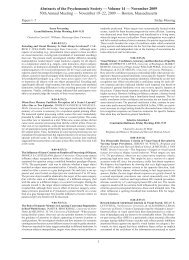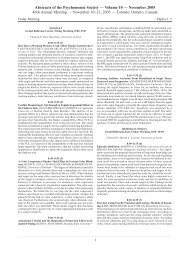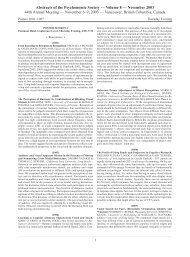S1 (FriAM 1-65) - The Psychonomic Society
S1 (FriAM 1-65) - The Psychonomic Society
S1 (FriAM 1-65) - The Psychonomic Society
Create successful ePaper yourself
Turn your PDF publications into a flip-book with our unique Google optimized e-Paper software.
Saturday Afternoon Papers 257–262<br />
more quickly, indicating they did not consider their falsity, but this<br />
only held for statements noninformative when false. Thus, semantic<br />
properties of statements determine whether people consider their<br />
falsity.<br />
Discourse Processing<br />
Shoreline, Saturday Afternoon, 3:30–5:30<br />
Chaired by Gary E. Raney, University of Illinois, Chicago<br />
3:30–3:45 (257)<br />
Transfer Across Seemingly Unrelated Narratives: A Similarity-<br />
Based Explanation. GARY E. RANEY, FRANCES DANIEL,<br />
JOANNA C. BOVEE, FIONA LYNCH, & TOM VADAKARA, University<br />
of Illinois, Chicago—According to Raney (2003), repetition<br />
effects and transfer benefits across texts will be larger if the situation<br />
models of the texts overlap than if they do not overlap. Klin, Ralano,<br />
and Weingartner (in press) tested this aspect of Raney’s model. <strong>The</strong>y<br />
had readers read two supposedly unrelated stories that shared a sentence<br />
and measured transfer (processing time of target sentences in the<br />
second story). <strong>The</strong>y concluded that transfer was found across unrelated<br />
stories. To make this claim, Klin et al. must demonstrate that<br />
their story pairs are unrelated. We present passage similarity ratings<br />
from 4 studies supporting the conclusion that their story pairs are related.<br />
Similarity ratings were largest in those conditions where Klin<br />
et al. found fastest processing times and were smallest where Klin<br />
et al. found slowest processing times. We discuss these findings in relation<br />
to other research that proposes evidence of transfer across unrelated<br />
passages.<br />
3:50–4:05 (258)<br />
Verb Aspect and Event Simulations. CAROL J. MADDEN, Erasmus<br />
University Rotterdam, & DAVID J. THERRIAULT, University of<br />
Florida—According to embodied frameworks of language comprehension,<br />
pictures of instruments in use (open umbrella, uncapped pen)<br />
should better match readers’ simulations of described events than instruments<br />
not in use (closed umbrella, capped pen). This effect may<br />
be stronger for events described as ongoing (imperfective aspect)<br />
rather than completed (perfect aspect). Participants read imperfective<br />
(was playing) and perfect (had played) event descriptions, word by<br />
word in a rebus paradigm, with the critical instrument word replaced<br />
by a picture of that instrument in use or not in use. Keypresses to advance<br />
through in-use pictures were faster than keypresses for not inuse<br />
pictures in both imperfective and perfect sentences. Furthermore,<br />
keypresses on the two words following the picture, as well as sentencefinal<br />
sensibility judgments also showed the in-use advantage, although<br />
only for imperfective sentences. <strong>The</strong>se findings suggest that<br />
there are aspectual differences in the time course of perceptual simulations<br />
of events.<br />
4:10–4:25 (259)<br />
Cognitive and Neurological Bases of Inferential Processes During<br />
Reading. PAUL VAN DEN BROEK, ALEX MERKLE, & ELISSAIOS<br />
KARAGEORGIOU, University of Minnesota, PANAYIOTA KENDEOU,<br />
McGill University, & ART LEUTHOLD & APOSTOLOS GEORGOP-<br />
OULOS, University of Minnesota—How do we understand what we<br />
read? Reading comprehension is a complex process that involves the<br />
interpretation of unfolding text information using prior knowledge<br />
and the construction of a coherent representation of the text in the<br />
reader’s mind. In the present set of studies, we begin to explore the<br />
neurological bases of this complex process using magnetoencephalography<br />
(MEG). First, we use the Landscape Model theory of<br />
reading comprehension to make predictions about the specific<br />
40<br />
moment-by-moment comprehension activities during the reading of<br />
various texts. Next, we collect MEG data during reading for comprehension<br />
of these texts. Finally, we draw connections between the<br />
model and behavioral data to better understand the cognitive and neurological<br />
bases of reading comprehension.<br />
4:30–4:45 (260)<br />
Memory for Functional Relations in Text and Problem Solving.<br />
JOHN B. BLACK, Teachers College, Columbia University—This research<br />
investigated the relationship between participants’ memories<br />
for various kinds of information in expository texts and the participants’<br />
abilities to solve problems using that information. Of particular<br />
interest were participants’ memories for functional relations that<br />
describe how one entity changes as a function of changes in another<br />
entity, how integrated the memory for these functional relations is,<br />
and how well the participants can use this information to solve “whatif<br />
” problems (i.e., problems where a change is described and the participants<br />
have to figure out what other changes will occur). College<br />
students read texts describing systems of interacting entities, then recalled<br />
the texts, drew pictures of the text contents, and then solved the<br />
“what-if ” problems. <strong>The</strong> relationships between memory for the functional<br />
relations, the integration of those memories, and the problem<br />
solving performance were examined.<br />
4:50–5:05 (261)<br />
Age-Related Changes in Spoken Discourse Comprehension.<br />
MITCHELL S. SOMMERS, SANDRA HALE, JOEL MYERSON, &<br />
NATHAN S. ROSE, Washington University, & NANCY TYE-MURRAY<br />
& BRENT SPEHAR, Washington University Medical School—Previous<br />
research on adult age-related differences in speech comprehension has<br />
focused primarily on lower levels in the language comprehension<br />
process (i.e., phoneme and word perception, and, to a lesser extent,<br />
sentence comprehension). In contrast, the present study examined potential<br />
age-related differences in spoken discourse comprehension. To<br />
this end, we measured spoken discourse comprehension for three different<br />
passage types (lectures, interviews, and oral histories) using<br />
three types of comprehension questions (information, integration, and<br />
inference). In addition, we measured auditory sensitivity as a potential<br />
mediator of age-related differences. Consistent with previous<br />
studies, we found that spoken language comprehension declines as a<br />
function of age during adulthood. Importantly, we also found that taking<br />
into account normal age-related changes in auditory function did<br />
not substantially reduce this deficit. Instead, our results indicate that<br />
age-related differences in cognitive processes are primarily responsible<br />
for the deficits in spoken discourse comprehension.<br />
5:10–5:25 (262)<br />
Bill Clinton on the Middle East: Perspective in Media Interviews.<br />
CAMELIA SULEIMAN, Florida International University, &<br />
DANIEL C. O’CONNELL, Georgetown University (read by Daniel C.<br />
O’Connell)—Four TV and two radio interviews given by Bill Clinton<br />
after the publication of his memoirs in June 2004 are examined for expressions<br />
of perspective on the Middle East. Bill Clinton’s personal perspective<br />
is clearly reflected in his choice of referencing terms for parties<br />
in the Middle East conflict: <strong>The</strong> Israeli and Palestinian points of<br />
view are designated by first-person and third-person pronominals, respectively.<br />
A similar relationship is found for his references to the USA<br />
and Iraq. His perspective is manifested in his references to countries,<br />
people, and individual political leaders. Such references thus become<br />
expressions of a more general frame of power relationships in discourse,<br />
in which a progressive, advanced world is compared with a primitive,<br />
violent world. Implications for a theory of personal perspective in discourse<br />
and for the dialogic nature of perspective are discussed.





